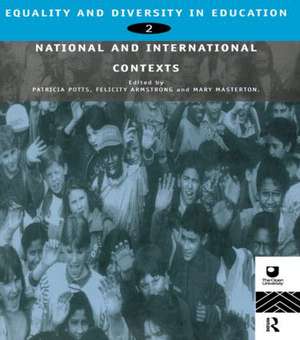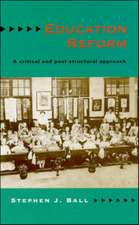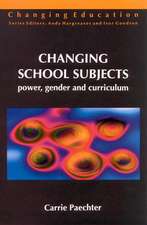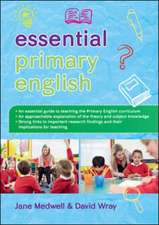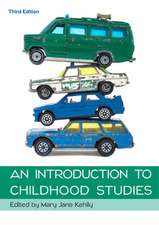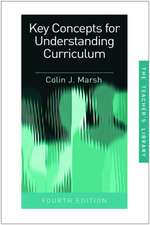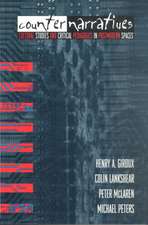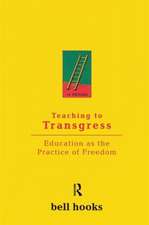Equality and Diversity in Education 2: National and International Contexts for Practice and Research: Developing Inclusive Curricula: Equality and Diversity in Education
Editat de Felicity Armstrong, Mary Masterton, Patricia Pottsen Limba Engleză Paperback – 15 dec 1994
Part one covers issues facing local government and the consumers of educational services in the UK. Part two compares policy and practice in eleven different countries and part 3 discusses research which explores the issues of equality and diversity in education.
This volume and her sister, Equality and Diversity in Education 1: Learning, Teaching and Managing in Schools are reraders for the Open University course, "Developing Inclusive Curricula: Equality and Diversity in Education" (E829). The two books in the series will appeal to teachers, non-teaching assistants and other school-based staff,parents,disabled people and those who have experienced difficulties in learning,social and health workers, and those working for voluntary organisations.
Preț: 447.05 lei
Nou
Puncte Express: 671
Preț estimativ în valută:
85.55€ • 88.99$ • 70.63£
85.55€ • 88.99$ • 70.63£
Carte tipărită la comandă
Livrare economică 14-28 aprilie
Preluare comenzi: 021 569.72.76
Specificații
ISBN-13: 9780415119986
ISBN-10: 0415119987
Pagini: 298
Dimensiuni: 152 x 229 x 16 mm
Greutate: 0.56 kg
Ediția:New.
Editura: Taylor & Francis
Colecția Routledge
Seria Developing Inclusive Curricula: Equality and Diversity in Education
Locul publicării:Oxford, United Kingdom
ISBN-10: 0415119987
Pagini: 298
Dimensiuni: 152 x 229 x 16 mm
Greutate: 0.56 kg
Ediția:New.
Editura: Taylor & Francis
Colecția Routledge
Seria Developing Inclusive Curricula: Equality and Diversity in Education
Locul publicării:Oxford, United Kingdom
Public țintă
PostgraduateNotă biografică
Felicity Armstrong, Mary Masterton, Patricia Potts
Cuprins
Introduction; I: National contexts for education in the 1990s; A: Educational communities and local government; A 1: ‘Barnsley bashing'. Communities and schools in the 1990s; A 2: Local authorities in the 1990s. A county perspective: Kent; A 3: Opting into irrelevance; A 4: Local government reorganisation and its implications for educational equality; B: Educational consumers and legislation; B 5: Trends in law: fifteen years of education policy-making, 1979–94; B 6: From Bill to Act: the passing of the 1993 Education Act; B 7: Parents' perspectives: towards positive support for disabled children and those who experience difficulties in learning; B 8: The case for anti-discrimination legislation; II: Europe and beyond; 9: ‘Appellation contrôlée': mixing and sorting in the French education system; 10: Early childhood services in Italy, Spain and the United Kingdom; 11: Parents and schooling in the European Union: a case study from Denmark and Germany; 12: Inclusive education in Spain and Greece; 13: Teacher unions, special education and Europe: a study in international policy-making; 14: Special educational provision from a Czech Republic perspective; 15: South and north: special educational provision in New Zealand, Britain and the United States; 16: Reforming special education in China; 17: The role of special education in a changing South Africa; III: Emancipatory research; 18: Accidental emancipatory action? The evolution of a project in which I learned how to work with shifting sands; 19: Geoffrey and Michelle: a review of the learning needs of two students with profound and multiple learning difficulties; 20: Personal and political: a feminist perspective on researching physical disability; 21: Music, sounds, braille and speech – a multi-media computer for blind people; 22: Cultural differences: Deaf and hearing researchers working together; 23: Inclusive education in Australia: policy development and research; 24: Exclusion and reintegration: policy and practice for junior pupils; 25: Special educational needs: from disciplinary to pedagogic research
Descriere
Designed to accompany the Open University course "Developing Intensive Curricula: Equality and Diversity in Education", Volume 2 will appeal to research students and special needs professionals interested in understanding education in the 1990s
